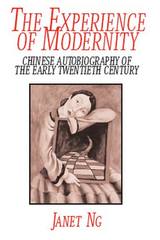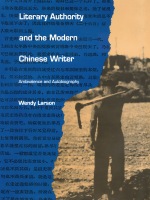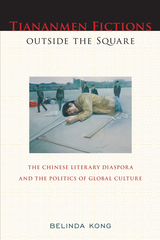
The May Fourth Era (1917-40) began as a movement to make the classical literary language accessible to the common people and became a broader political movement against imperialism. The writing of autobiography was influenced by the idea of literature's social and political mission, yet at the same time autobiography was a uniquely potent venue for individual expression. Janet Ng examines this notion in The Experience of Modernity within the framework of autobiographical writings by Chen Hengzhe, Lu Xun, Hu Shi, Xie Bingying, Xiao Hong, Eileen Chang, Yu Dafu, and Shen Congwen.
Janet Ng is Assistant Professor of Asian Literature, the College of Staten.

Larson focuses on the most famous writers associated with the May Fourth Movement, a group most active in the 1920s and 1930s, and their fundamental ambivalence about writing. She analyzes how their writing paradoxically characterized textual labor as passive, negative, and inferior to material labor and the more physical political work of social progress, and she describes the ways they used textual means to devalue literary labor.
The impact of China’s increasing contact with the West—particularly the ways in which Western notions of “individualism” and “democracy” influenced Chinese ideologies of self and work—is considered. Larson also studies the changes in China’s social structure, notably those linked to the abolition in 1905 of the educational exam system, which subsequently broke the link between the mastery of certain texts and the attainment of political power, further denigrating the cultural role of the writer.



An exciting analysis of the myriad literary effects of Tiananmen, Belinda Kong's Tiananmen Fictions Outside the Square is the first full-length study of fictions related to the 1989 movement and massacre. More than any other episode in recent world history, Tiananmen has brought a distinctly politicized Chinese literary diaspora into stark relief.
Kong redefines Tiananmen's meaning from an event that ended in local political failure to one that succeeded in producing a vital dimension of contemporary transnational writing today. She spotlights key writers-Gao Xingjian, Ha Jin, Annie Wang, and Ma Jian-who have written and published about the massacre from abroad. Their outsider/distanced perspectives inform their work, and reveal how diaspora writers continually reimagine Tiananmen's relevance to the post-1989 world at large.
Compelling us to think about how Chinese culture, identity, and politics are being defined in the diaspora, Tiananmen Fictions Outside the Square candidly addresses issues of political exile, historical trauma, global capital, and state biopower.

In this first full-fledged intellectual biography of the brilliant and multifaceted Chinese scholar Wang Kuo-wei (1877–1927), Joey Bonner throws important new light on the range and course of ideas in early twentieth-century China. Coincidentally, she illuminates the nature of Wang’s intimate, thirty-year personal and professional association with the well-known Chinese scholar Lo Chen-yü (1866–1940) and provides a most comprehensive and compelling account of her biographee’s posthumously controversial career in the years following the 1911 Revolution.
Pursuing her subject across the whole spectrum of his many scholarly interests, Bonner critically examines Wang’s essays on German philosophy and philosophical aesthetics; his poetry, literary criticism, and aesthetic theory; and his works on ancient Chinese history, particularly of the Shang dynasty. Insightfully relating his strenuous intellectual search in the fields of philosophy, literature, and history to his very personal quest for truth, beauty, and virtue, Bonner shows in this finely crafted book how Wang’s unhappiness in later life as well as his suicide can be understood only within the context of his humanistic concerns in general and his extreme commitment in the postimperial period to the Confucian ethicoreligious tradition in particular. Without compromising the clearheaded critical detachment that characterizes her analysis of the intricacies of his thought, Bonner has produced a portrait of Wang Kuo-wei suffused with warmth and sympathetic respect.
READERS
Browse our collection.
PUBLISHERS
See BiblioVault's publisher services.
STUDENT SERVICES
Files for college accessibility offices.
UChicago Accessibility Resources
home | accessibility | search | about | contact us
BiblioVault ® 2001 - 2024
The University of Chicago Press









